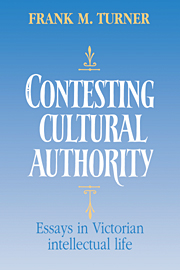Book contents
- Frontmatter
- Contents
- Preface
- I SHIFTING BOUNDARIES
- 1 The religious and the secular in Victorian Britain
- 2 Cultural apostasy and the foundations of Victorian intellectual life
- 3 The crisis of faith and the faith that was lost
- 4 The secularization of the social vision of British natural theology
- II SCIENCE AND THE WIDER CULTURE
- III MODERNS AND ANCIENTS
- Index
2 - Cultural apostasy and the foundations of Victorian intellectual life
Published online by Cambridge University Press: 22 September 2009
- Frontmatter
- Contents
- Preface
- I SHIFTING BOUNDARIES
- 1 The religious and the secular in Victorian Britain
- 2 Cultural apostasy and the foundations of Victorian intellectual life
- 3 The crisis of faith and the faith that was lost
- 4 The secularization of the social vision of British natural theology
- II SCIENCE AND THE WIDER CULTURE
- III MODERNS AND ANCIENTS
- Index
Summary
No other group of major British intellectual and cultural figures still seems to appear so much as insects trapped in amber as do the Victorians. We repeatedly acknowledge the striking transformations that occurred in nineteenth-century political, social, and economic activity, but we have too rarely analysed in a distinctly historical fashion changes that occurred in Victorian intellectual life or the manner in which they took place. Ironically, until very recently we tended to analyse the two or three intellectual generations that carried the concept of evolution to the forefront of Western thought in distinctly non-evolutionary terms. We often write about Victorian intellectuals as if they existed outside time. We rarely imagine them as young or as changing or as developing. We forget that John Keats and Thomas Carlyle were born in the same year: the one remaining ever young, the other seeming ever grizzled. Nor do we often regard the Victorians as having been perhaps fundamentally unconventional. How could we? Were they not the people who forged the conventions against which rebellion in this century from Bloomsbury onward has been and continues to be a cultural cottage industry? Despite enormous strides in the scholarship of the past quarter century we too often continue to view and treat Victorian intellectuals as historical figures who did not themselves develop historically. In that respect, we approach Victorian intellectual and literary life as some nineteenth-century scriptural geologists viewed the layers of geological strata.
- Type
- Chapter
- Information
- Contesting Cultural AuthorityEssays in Victorian Intellectual Life, pp. 38 - 72Publisher: Cambridge University PressPrint publication year: 1993

